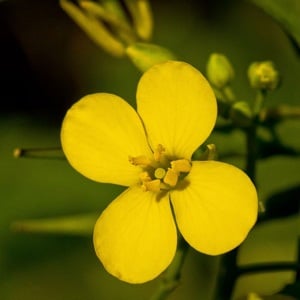
Canola flower
www.soill.co.za
There is a perception that canola is a GMO, but this is not true. In Canada during the 1970s the Canola plant was naturally bred by using traditional plant breeding techniques. This consisted of planting female and male plants in separate rows and bees cross-pollinating them.
Overseas some canola seed is genetically modified to make it easier and cheaper to farm with. However, in South Africa only non-GMO seed is used in the production of local canola oil.
During the months of April, May and June farmers start planting canola in the Overberg and Swartland regions in the Western Cape. This is the perfect time for growth due to the winter rain and ideal temperatures.
Harvesting
Between July and September canola blooms and turns these regions into picturesque yellow landscapes. During this period canola pods (almost like pea pods, just smaller) start to grow on the plant. The flowers eventually fall off by October but the pods with the canola seed, which contain the canola oil, remain.
Harvesting starts at the end of October/beginning of November. Most local farmers cut the canola plants and let them rest on the ground to dry out. Thereafter they are harvested and transported to the regional silos. Here tests are done to ensure that the seed is of the highest quality, before being stored in silos waiting for processing by the factory in Swellendam.
Refining process
When the canola oil is extracted from the canola seed, a by-product called oil cake is left behind which is used by local farmers as livestock feed due to its high protein and omega 3 levels.
Canola oil, like all other high temperature oils, is refined. Refining is a necessary process to remove taste and odour from the oil. This gives the consumer a neutral tasting oil that won't influence the flavour of their food during cooking or baking. The process happens in a sealed vacuum and thus does not alter the composition of the oil, but does ensure an oil that won't breakdown at high temperatures when being used by the consumer. Hundreds of quality checks are done throughout the process to ensure a quality product.
The canola oil is then either bottled or transported to other manufacturers that use it in to make a variety of different products.
Quality control
Bottling takes place at the same production facility, ensuring the same high standard that is maintained during production is also achieved with the end product.
A variety of sizes are bottled by an automated machine, then labelled and packed by employees, throughout the process quality checks are done to ensure only the finest products reach the end user. These products are then boxed and transported to retailers for consumers to enjoy.
With local canola oil, unlike imported canola oil that spends weeks in containers, quality can be guaranteed by being involved in every step of process. The growing and producing of canola oil locally is also a sustainable and multi-faceted industry providing work not only to factory workers, farmers and their workers but a range of other industries. Buy local, because local is lekker.
For more information visit www.bwelloil.co.za or www.soill.co.za
Overseas some canola seed is genetically modified to make it easier and cheaper to farm with. However, in South Africa only non-GMO seed is used in the production of local canola oil.
During the months of April, May and June farmers start planting canola in the Overberg and Swartland regions in the Western Cape. This is the perfect time for growth due to the winter rain and ideal temperatures.
Harvesting
Between July and September canola blooms and turns these regions into picturesque yellow landscapes. During this period canola pods (almost like pea pods, just smaller) start to grow on the plant. The flowers eventually fall off by October but the pods with the canola seed, which contain the canola oil, remain.
Harvesting starts at the end of October/beginning of November. Most local farmers cut the canola plants and let them rest on the ground to dry out. Thereafter they are harvested and transported to the regional silos. Here tests are done to ensure that the seed is of the highest quality, before being stored in silos waiting for processing by the factory in Swellendam.
Refining process
When the canola oil is extracted from the canola seed, a by-product called oil cake is left behind which is used by local farmers as livestock feed due to its high protein and omega 3 levels.
Canola oil, like all other high temperature oils, is refined. Refining is a necessary process to remove taste and odour from the oil. This gives the consumer a neutral tasting oil that won't influence the flavour of their food during cooking or baking. The process happens in a sealed vacuum and thus does not alter the composition of the oil, but does ensure an oil that won't breakdown at high temperatures when being used by the consumer. Hundreds of quality checks are done throughout the process to ensure a quality product.
The canola oil is then either bottled or transported to other manufacturers that use it in to make a variety of different products.
Quality control
Bottling takes place at the same production facility, ensuring the same high standard that is maintained during production is also achieved with the end product.
A variety of sizes are bottled by an automated machine, then labelled and packed by employees, throughout the process quality checks are done to ensure only the finest products reach the end user. These products are then boxed and transported to retailers for consumers to enjoy.
With local canola oil, unlike imported canola oil that spends weeks in containers, quality can be guaranteed by being involved in every step of process. The growing and producing of canola oil locally is also a sustainable and multi-faceted industry providing work not only to factory workers, farmers and their workers but a range of other industries. Buy local, because local is lekker.
For more information visit www.bwelloil.co.za or www.soill.co.za




 Publications
Publications
 Partners
Partners















